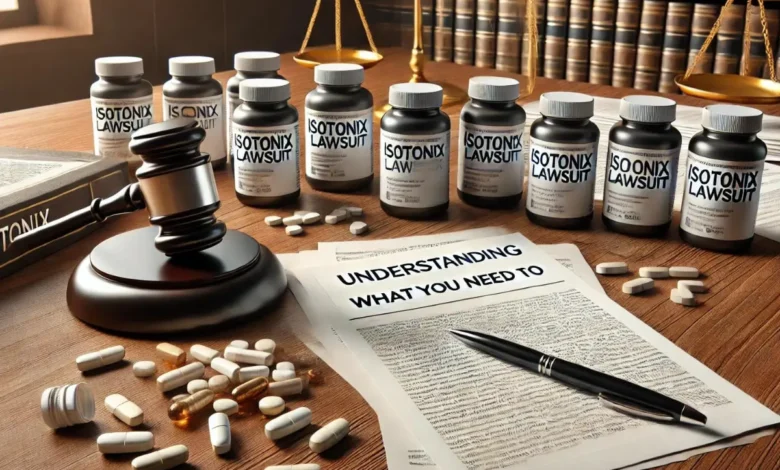
Table of Contents
ToggleIntroduction to Isotonix Lawsuit
In the realm of dietary supplements, Isotonix has garnered attention not only for its innovative approach to nutrient delivery but also for the legal battles it has faced. The Isotonix lawsuit, which revolves around claims against the company’s products and practices, highlights significant issues in the supplement industry. This article delves into the details of the Isotonix lawsuit, exploring its origins, the parties involved, the implications for consumers, and what it means for the broader supplement market.
Background on Isotonix
Isotonix, a brand under the umbrella of Market America, is known for its line of dietary supplements that utilize a unique isotonic delivery system. This system aims to deliver nutrients more efficiently than traditional tablets or capsules by matching the osmotic pressure of the body’s fluids. The claim is that this method enhances absorption and maximizes the efficacy of the supplements.
Despite the innovative approach, Isotonix has not been immune to controversy. The company’s products, while popular among health enthusiasts, have faced scrutiny and legal challenges, culminating in a high-profile lawsuit that has attracted significant attention.
The Genesis of the Lawsuit
The Isotonix lawsuit primarily began with consumer complaints and legal actions concerning the efficacy and safety of its products. Plaintiffs have raised several issues, including:
- Misleading Claims: Consumers have alleged that Isotonix made exaggerated claims about the effectiveness of its products. The isotonic delivery system was marketed as superior to other supplement forms, but some customers felt that the results did not match the company’s assertions.
- Product Safety: There have been concerns regarding the safety of some Isotonix products. Reports of adverse effects and lack of transparency regarding ingredient sourcing and testing have fueled legal claims.
- Marketing Practices: The lawsuit also touches on whether Isotonix’s marketing strategies were misleading or deceptive. This includes scrutiny over how the company presented scientific evidence to support its claims.
Key Parties Involved
The Isotonix lawsuit involves multiple stakeholders, including:
- Plaintiffs: The plaintiffs are typically consumers who have used Isotonix products and believe they have been harmed by misleading claims or unsafe products. In some cases, these individuals have experienced health issues or felt misled about the effectiveness of the supplements.
- Defendants: Market America and its Isotonix division are the primary defendants in the lawsuit. The company faces allegations of false advertising, breach of warranty, and negligence. Market America has maintained that its products are safe and effective when used as directed.
- Legal Representatives: Both sides are represented by legal teams specializing in consumer protection and product liability. These attorneys are responsible for presenting evidence, arguing their cases, and negotiating settlements.
Legal Proceedings and Developments
The legal journey of the Isotonix lawsuit has been complex and multifaceted. Key developments include:
- Initial Filings: The lawsuit began with the filing of complaints by consumers who felt aggrieved by Isotonix products. These complaints were filed in various jurisdictions, leading to a consolidation of cases in a central court for streamlined proceedings.
- Evidence Presentation: Throughout the trial, both sides have presented extensive evidence. Plaintiffs have provided testimonials, medical records, and expert opinions to support their claims. Defendants have countered with evidence supporting the safety and efficacy of their products, including scientific studies and internal testing data.
- Settlement Negotiations: In many high-profile cases like this, parties may seek a settlement to avoid prolonged litigation. Negotiations can involve financial compensation, changes in product labeling, or adjustments in marketing practices.
- Court Rulings: If the case goes to court, the ruling could result in significant legal and financial repercussions for Isotonix. Possible outcomes include damages awarded to plaintiffs, injunctions against certain marketing practices, or changes in product formulations.
Implications for Consumers

The Isotonix lawsuit has notable implications for consumers:
- Consumer Protection: The lawsuit underscores the importance of consumer protection in the supplement industry. It highlights the need for transparency and honesty in product claims and safety.
- Product Research: Consumers are encouraged to conduct thorough research before using dietary supplements. This includes understanding the claims made by manufacturers, checking for independent reviews, and consulting with healthcare professionals.
- Legal Recourse: The case also sheds light on the legal avenues available to consumers who believe they have been misled or harmed by a product. It emphasizes the role of the judiciary in holding companies accountable for their practices.
Broader Impact on the Supplement Industry
The Isotonix lawsuit has broader implications for the dietary supplement industry:
- Regulatory Scrutiny: High-profile lawsuits can lead to increased regulatory scrutiny. This may result in more stringent regulations and enforcement actions aimed at ensuring product safety and accurate marketing.
- Industry Standards: The lawsuit could influence industry standards and practices. Companies may need to enhance their transparency, improve product testing, and ensure that marketing claims are substantiated by credible evidence.
- Consumer Awareness: Legal cases like this can raise consumer awareness about the potential risks associated with dietary supplements. This may lead to more informed purchasing decisions and greater demand for products that meet high safety and efficacy standards.
Conclusion
The Isotonix lawsuit serves as a crucial case study in the intersection of consumer rights, product safety, and legal accountability in the supplement industry. As the legal proceedings unfold, the outcomes will likely have lasting effects on the industry, influencing how supplements are marketed, regulated, and consumed.
For consumers, the lawsuit highlights the importance of diligence and critical thinking when choosing dietary supplements. For the industry, it serves as a reminder of the need for transparency and adherence to high standards of safety and efficacy. As the case progresses, all eyes will be on the courts to determine the final verdict and its implications for both Isotonix and the broader supplement market.




